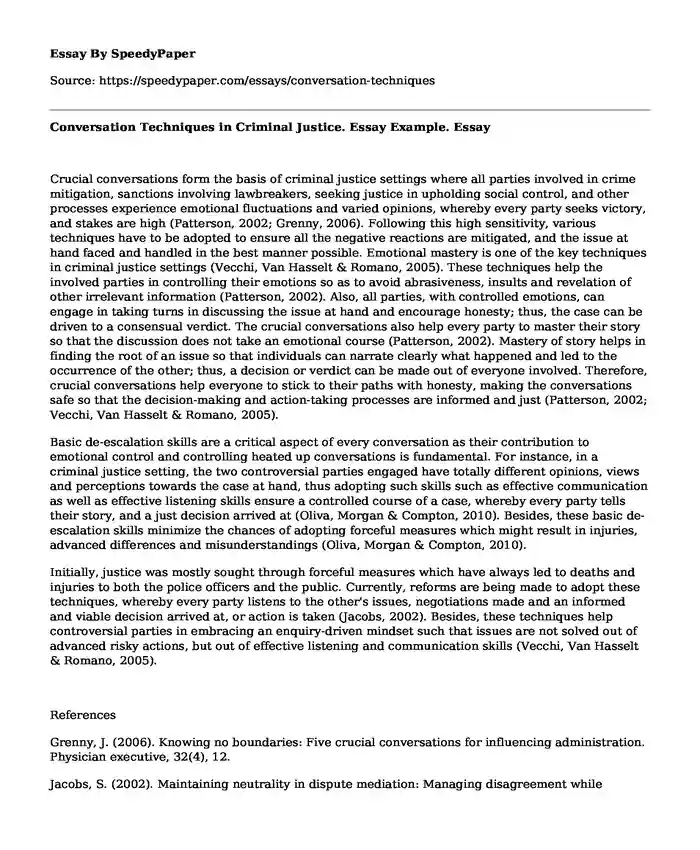
| Type of paper: | Essay |
| Categories: | Communication Criminal justice |
| Pages: | 2 |
| Wordcount: | 549 words |
Crucial conversations form the basis of criminal justice settings where all parties involved in crime mitigation, sanctions involving lawbreakers, seeking justice in upholding social control, and other processes experience emotional fluctuations and varied opinions, whereby every party seeks victory, and stakes are high (Patterson, 2002; Grenny, 2006). Following this high sensitivity, various techniques have to be adopted to ensure all the negative reactions are mitigated, and the issue at hand faced and handled in the best manner possible. Emotional mastery is one of the key techniques in criminal justice settings (Vecchi, Van Hasselt & Romano, 2005). These techniques help the involved parties in controlling their emotions so as to avoid abrasiveness, insults and revelation of other irrelevant information (Patterson, 2002). Also, all parties, with controlled emotions, can engage in taking turns in discussing the issue at hand and encourage honesty; thus, the case can be driven to a consensual verdict. The crucial conversations also help every party to master their story so that the discussion does not take an emotional course (Patterson, 2002). Mastery of story helps in finding the root of an issue so that individuals can narrate clearly what happened and led to the occurrence of the other; thus, a decision or verdict can be made out of everyone involved. Therefore, crucial conversations help everyone to stick to their paths with honesty, making the conversations safe so that the decision-making and action-taking processes are informed and just (Patterson, 2002; Vecchi, Van Hasselt & Romano, 2005).
Basic de-escalation skills are a critical aspect of every conversation as their contribution to emotional control and controlling heated up conversations is fundamental. For instance, in a criminal justice setting, the two controversial parties engaged have totally different opinions, views and perceptions towards the case at hand, thus adopting such skills such as effective communication as well as effective listening skills ensure a controlled course of a case, whereby every party tells their story, and a just decision arrived at (Oliva, Morgan & Compton, 2010). Besides, these basic de-escalation skills minimize the chances of adopting forceful measures which might result in injuries, advanced differences and misunderstandings (Oliva, Morgan & Compton, 2010).
Initially, justice was mostly sought through forceful measures which have always led to deaths and injuries to both the police officers and the public. Currently, reforms are being made to adopt these techniques, whereby every party listens to the other's issues, negotiations made and an informed and viable decision arrived at, or action is taken (Jacobs, 2002). Besides, these techniques help controversial parties in embracing an enquiry-driven mindset such that issues are not solved out of advanced risky actions, but out of effective listening and communication skills (Vecchi, Van Hasselt & Romano, 2005).
References
Grenny, J. (2006). Knowing no boundaries: Five crucial conversations for influencing administration. Physician executive, 32(4), 12.
Jacobs, S. (2002). Maintaining neutrality in dispute mediation: Managing disagreement while managing not to disagree. Journal of Pragmatics, 34(10), 1403-1426.
Oliva, J. R., Morgan, R., & Compton, M. T. (2010). A practical overview of de-escalation skills in law enforcement: Helping individuals in crisis while reducing police liability and injury. Journal of Police Crisis Negotiations, 10(1-2), 15-29.
Patterson, K. (2002). Crucial Conversations: Tools for talking when stakes are high. Tata McGraw-Hill Education.
Vecchi, G. M., Van Hasselt, V. B., & Romano, S. J. (2005). Crisis (hostage) negotiation: Current strategies and issues in high-risk conflict resolution. Aggression and Violent Behavior, 10(5), 533-551.
Cite this page
Conversation Techniques in Criminal Justice. Essay Example.. (2019, Sep 25). Retrieved from https://speedypaper.net/essays/conversation-techniques
Request Removal
If you are the original author of this essay and no longer wish to have it published on the SpeedyPaper website, please click below to request its removal:
- Management of Diabetes - Free Essay with a Literature Review Example
- Psychology Essay Sample on Attachment Theory
- Organizational Climate in Healthcare Settings - Statistics Essay Example
- History and Practice of Nursing Research, Free Essay
- Essay Example on Warehouse Management
- Essay Sample on Troubled Asset Relieve Program (TARP) 2008
- Essay Sample on Current Economic Topic: Inflation
Popular categories




